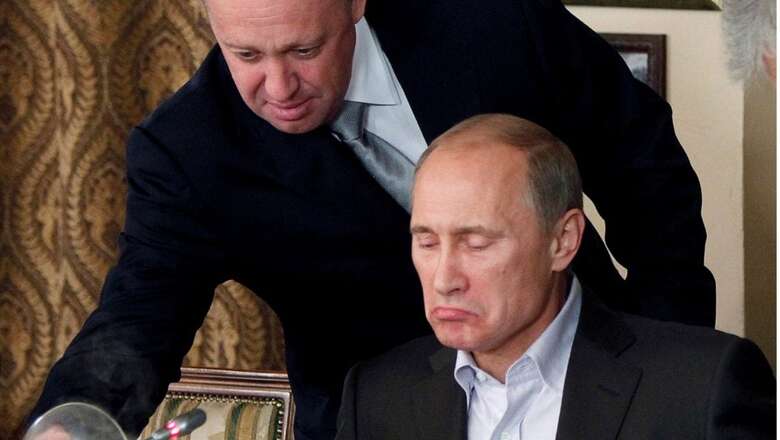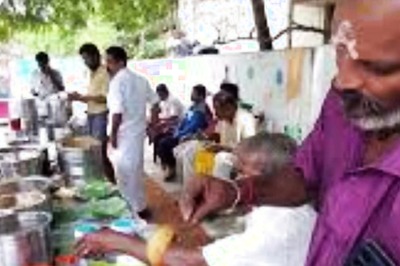
views
On 24th June 2023, the Wagner Group’s leader, Yevgeny Prigozhin, staged a revolution against Russia after alleging that the Russian army deliberately targeted his soldiers. Prigozhin wanted justice, which he met with an armed insurgency. Then, before Prigozhin apparently backed down following talks with Belarus’s leader, the Wagner Group seized critical military installations in Rostov-on-Don, Russia’s southern military district’s headquarters. Prigozhin is now said to be escaping to Belarus, where he and his soldiers will evade penalties. Since the commencement of the Russia-Ukraine war, the two sides have made countless derogatory remarks and engaged in hostile activities against one other. The attempted insurgency is essentially the outcome of the deployment of the Russian army and the Wagner Group in Ukraine — as well as the political framework that sustains their operations.
The Wagner Group’s ties to the Russian army frayed almost immediately after the war in Ukraine began. Prior to the conflict, the Wagner Group worked unofficially to serve Russian state objectives. They supplied the Russian government with plausible deniability in regions where Russia had a strong interest but sought to restrict its direct engagement, such as Syria and Sudan. For example, Russia utilised the Wagner Group to help it take Crimea in 2014. Russia’s use of the Wagner Group in the Donbas region of eastern Ukraine in 2014 also permitted the Russian army to deny involvement. In other words, the Wagner Group and Russian military domains supported each other’s goals.
The protracted Russia-Ukraine War has caused a profound transformation in the dynamics between the two nations. Initially, the Russian army anticipated a swift and decisive military triumph in Ukraine, only to be confronted with immediate setbacks upon the commencement of hostilities. Compelled by these failures, Russia resorted to deploying the Wagner Group as an active support mechanism for its operations. The rift that has emerged within the Ukrainian conflict, pitting the Wagner Group against Russian government forces, bears significant implications across various domains.
Foremost, the Wagner Group’s close affiliations with the Russian military can equip Ukraine with invaluable intelligence, empowering it to fortify its defences and mount more successful offensives. Moreover, this split has the potential to amplify international pressure on Russia to terminate its involvement in the conflict, originating from governmental entities, corporate actors, and international organisations. Concurrently, this internal rupture bolsters Ukrainian morale, instilling a sense of optimism and resilience, So much so that Ukrainian forces are thinking of planning a counter-offensive in the Russian regions, thereby impeding Russia’s momentum objectives within Ukrainian territory. Furthermore, this divide could aggravate tensions between Russia and Western powers, with the Wagner Group assuming the role of a perceived proxy force, potentially resulting in the imposition of sanctions or other deterrent measures. Lastly, the splintering or engagement of the Wagner Group in other regional conflicts may hinder the resolution of the Ukrainian conflict and exacerbate violence within the broader region.
Assisting Russia in Ukraine
In terms of military operations, Russia’s deployment of the Wagner Group aided in the stabilisation of its operations in Ukraine. In 2022, the Wagner Group, unlike the majority of the Russian army, was a highly trained unit. Factually, men from the Wagner Group were responsible for some of Russia’s early triumphs, notably the Battle of Severodonetsk. These operations, however, were not free. The Wagner Group sustained so many losses that it was unable to continue with its regular methods. Instead, to restore its depleted personnel, the Wagner Group launched widespread recruiting drives, including in Russian jails. This muddled the distinctions between the Wagner Group and the Russian army. Whereas the two organisations historically had discrete domains of influence, they now operate as basically conventional forces. Overlapping areas of influence, although necessary in the case of the Russian army and the Wagner Group, are not unusual in Russia. They are, in reality, a characteristic of the Russian political system, and one person is to blame – Vladimir Putin.
Where are the top generals?
Following a failed mercenary rebellion to depose top military authorities, Russia’s most senior generals have vanished from public view, implying a probable purge inside the armed services. Two top Russian generals have vanished from public view. Their destiny is unknown as Putin strives to restore his influence. Prigozhin had sought the ouster of the military minister, but Sergei Shoigu has made many appearances this week. Rumours circulate about the arrest and incarceration of one or more of the generals for their supposed involvement in the insurrection. Following a failed mercenary mutiny aimed at removing the top brass, Russia’s most senior generals have disappeared from public view, as President Vladimir Putin seeks to regain his control.
According to unconfirmed reports, at least one individual has been apprehended. General Valery Gerasimov, the deputy commander of Russian forces in Ukraine, has not appeared in public or on state television since the failed insurrection on Saturday, when Prigozhin demanded Gerasimov’s surrender. He hasn’t been referenced in a news statement from the defence ministry since June 9. While the Kremlin dismissed these stories, claiming they were speculative, doubts about Surovikin’s (Gerasimov’s deputy) credibility remain unresolved. According to unconfirmed claims, he has been arrested, while some claim he and other top officers are being questioned by the FSB security service to determine their allegiance. This prospective purge might have an influence on Russia’s stance on the Ukraine war and cause internal strife, while simultaneously solidifying the positions of other loyal military and security figures.
Some Russian and Western military and political observers believe Defence Minister Sergei Shoigu, a longtime Putin loyalist whom Prigozhin sought to depose alongside Gerasimov due to alleged ineptitude, may now be safer in his post. In the context of General Shoigu and General Gerasimov, A Russian military researcher Michael Kofman from the Carnegie Endowment for International Peace think tank took to Twitter, saying “I think he (Prigozhin) actually expected something to be done about them (The Generals), that Putin would rule in his favour.”
After openly announcing that his forces were prepared to “stand to the death” to protect Moscow from Wagner, this appears to be another advantage. In continuation, the former bodyguard to Putin, General Viktor Zolotov said “Instead, despite being universally recognised as incompetent and widely despised in the Russian Federation’s armed forces, his mutiny may have ensured their continued tenure.”
In the aftermath of the rebellion, he has spoken of acquiring heavy armament and tanks for his soldiers. Gerasimov was conspicuously absent as Putin hailed the army for avoiding civil war on Tuesday, in contrast to Shoigu, who has made many public appearances subsequently. Surovikinwas last seen on Saturday in a video pleading with Prigozhin to end his rebellion. He seemed exhausted, and it was unclear if he was speaking under constraint. Dara Massicot, a Russian military specialist at the RAND Corporation think tank, said there was something strange about the footage, which showed Surovikin with an automatic rifle on his lap.
Putin’s impact
Finally, only the Russian president has the authority to settle disagreements among his subordinates. This not only inhibits Putin’s subordinates’ capacity to create power bases that might oppose him, but it also maintains Putin’s prominence in the political system. This part of the Russian political system is very successful in times of calm, as long as Putin’s influence and authority are maintained. However, in times of impending conflict or outright war, overlapping functions can quickly become a burden. In the run-up to Russia’s invasion of Ukraine, it became obvious that Putin’s subordinates did not give him an accurate and comprehensive image of either the Ukrainian or Russian armed forces’ capabilities. During the fight, cooperation between contending sides – in this example, the Russian army and paramilitary forces – has been minimal at best. In the worst-case scenario, tensions between the Wagner Group and the Russian army might erupt into an all-out civil war, whether Prigozhin is in the picture or not. While Putin appears to have weathered the storm for the time being, the Wagner Group is merely the most visible manifestation of simmering resentment within paramilitary forces against Russia.
Putin’s power slippage?
The ongoing dispute between the Wagner Group and Russian government forces carries profound implications for Putin’s political influence and global standing. It serves as a poignant revelation of potential deficiencies in Putin’s command over the Russian military, thereby challenging the narrative of his unassailable authority. Moreover, the Wagner Group’s alleged involvement in war crimes during the Ukrainian conflict has the potential to further tarnish Russia’s reputation on the international stage. Additionally, the departure of the Wagner Group may impede Putin’s strategic objectives in the Ukrainian war, as it could weaken Russia’s position on the battlefield. This development may wear down Putin’s internal authority within the Russian government, complicate efforts to shape the narrative surrounding the conflict, and hinder his aspirations in Ukraine.
The conflict between the Wagner Group and Russian government forces signifies a significant erosion of Putin’s influence, which in turn undermines his authority and reputation. It serves as a stark reminder of Putin’s limited control over the Russian military, as evidenced by the Wagner Group’s defiance, casting doubt on his perceived omnipotence. This development has the potential to embolden other military factions, leading to domestic instability and disorder. Moreover, the fallout provides impetus to Putin’s adversaries, encouraging open challenges that could ignite a power struggle within the administration, further diminishing his authority. The involvement of the Wagner Group in war crimes in Ukraine further stains Russia’s reputation, eroding international support for Putin’s regime and potentially fueling domestic unrest and demonstrations, thereby jeopardising his grip on power.
In essence, this situation delivers a substantial blow to Putin’s political power and carries far-reaching negative implications. It still has the potential to change the power balance beneath Putin. He is undoubtedly in one of the most vulnerable positions of his presidency since winning the election in 2000, but he will not give up power easily. Putin will examine any and all options for reestablishing his power over Russia in order to retain his influence, with clear ramifications for the Ukraine war. In Putin’s opposition in the 2024 election, from individuals to political entities, we see an all-star line-up of opposition.
Alexei Navalny, an influential figure within the Russian opposition movement, has long voiced critical perspectives on Putin’s government. Following his poisoning in 2020 and subsequent imprisonment in 2021, Navalny’s followers have continued to mobilise protests against the government, buoyed by his enduring popularity among segments of the Russian population. Grigory Yavlinsky, an esteemed economist and politician, has maintained a staunchly critical stance towards Putin’s administration since the early 2000s, assuming leadership of the Yabloko party to counter Putin’s policies. Dmitry Gudkov, an active member of the State Duma, fearlessly denounces Putin’s governance and expresses dissent over the Ukrainian conflict. These individuals, in conjunction with diverse political entities such as the Open Russia Foundation, Anti-Corruption Foundation, and Memorial Human Rights Center, skillfully exploit Putin’s diminishing authority to orchestrate protests, demand his resignation, and champion the principles of democracy and human rights. Although the ultimate outcomes of their endeavours remain uncertain, it is indisputable that they pose formidable challenges to Putin’s grasp on power amid the ongoing crisis unfolding in Russia.
Historically, Western powers have implemented a range of strategies to undermine Putin’s authority and endeavour to depose him from leadership. Notably, they have wielded economic sanctions meticulously designed to target Russia’s economy, influential individuals, and military capabilities. These measures have effectively hindered Putin’s capacity to finance the ongoing conflict in Ukraine. Concurrently, Western nations have extended military assistance to Ukraine, encompassing the provision of weaponry and training, thereby bolstering Ukraine’s defensive capabilities against Russia and introducing complexities into Putin’s strategic objectives. Diplomatic isolation has been tactfully pursued, involving the expulsion of Russian diplomats and the suspension of Russia’s participation in international organisations. These actions have sought to diminish Russia’s global influence and exert mounting pressure on Putin to bring an end to the Ukrainian war. In addition, Western powers have actively supported Russian opposition groups, engaged in intelligence sharing with Ukraine, countered propaganda efforts, and fostered coalitions spanning diverse regions such as Europe, Asia, and North America. While the ultimate success of these endeavours remains uncertain, they have undoubtedly presented formidable challenges to Putin’s authority. The continuation of Western actions holds the potential to sustain pressure on Putin’s government, thereby possibly causing his eventual downfall. Nevertheless, it is imperative to acknowledge the plausibility that Putin may successfully navigate these challenges and maintain his grip on power. Only the passage of time will unveil the definitive outcome.
Putin’s control was put to the test as armed Wagner mercenaries challenged his authority on June 24-25. While the US had knowledge of the mutiny plans, Putin was unaware. It was revealed that elements within Russian intelligence, the military, and internal security agencies colluded with Prigozhin. This shattered Putin’s image as an all-powerful leader and raised doubts about his role as a protector of the elite. In a televised address, Putin appeared frightened before retreating from public view. He reluctantly engaged with Prigozhin through Lukashenko, and agreed to grant safe passage to Belarus for Prigozhin and his rebels, despite casualties caused by the Wagner forces.
The disloyalty within the Russian military and security services, as well as the absence of Rosgvardiya, poses a significant challenge for Putin. Loyalty in an authoritarian system is tied to perceived influence and power. With doubts about the execution of his orders, Putin’s options are limited. Purging the military and security services could harm combat readiness and morale. Swiftly ending the conflict with Ukraine is unlikely as Ukraine senses Putin’s weakness, highlighting a failed strategy.
The remaining option is to suppress opposition within the elite and escalate nuclear threats over Ukraine to intimidate Western leaders. However, these actions risk driving more defections among military, security, and government personnel who seek a brighter future for Russia. Putin finds himself in Zugzwang, where any move he makes worsens his situation.
The fate of Putin’s political career in Russia is a multifaceted and intricate matter, hinging upon a range of pivotal factors. The ongoing war in Ukraine stands as a litmus test, examining Putin’s authority and popularity while potentially emboldening those who oppose him. Furthermore, the strained Russian economy, resulting from the Ukrainian conflict and Western sanctions, has the potential to ignite social unrest and undermine Putin’s hold on power. The emergence of opposition movements that passionately criticise Putin’s government and call for his resignation presents a formidable challenge. Additionally, speculations surrounding Putin’s declining health, coupled with his age of 69, could ignite a power struggle within the government, providing a window of opportunity for his adversaries to contest his leadership on grounds of concerns regarding his governance capabilities.
In a time of internal tension, rushing to find a successor is unwise. Putin needs to identify a trusted individual who can ensure his safety and immunity. Speculation of Dmitry Patrushev as prime minister in the succession plan arose but seems to have changed. In the rare event of Vladimir Putin’s departure from office, several potential successors have been identified. Dmitry Medvedev, the current deputy prime minister and former president of Russia, is considered a moderate figure who remains loyal to Putin. Nikolai Patrushev, the Secretary of the Security Council, is viewed as a hardliner who would likely continue Putin’s policies. Sergey Shoigu, the Minister of Defense, is seen as a moderate figure compared to Patrushev but would maintain a focus on military strength. Igor Kovalchuk, a wealthy businessman and personal friend of Putin, could represent the interests of the Russian elite as a potential successor. Vladimir Yakunin, a former head of Russian Railways, is also considered a potential successor representing the interests of the Russian state. However, it remains possible that a new leader could emerge, as Russia’s political landscape is dynamic and unpredictable. Regardless, the next leader will face significant challenges in guiding the country through economic and political uncertainties during this transitional period.
The recent events unfolding in Russia and Ukraine echoing through the corridors of power, serve as a stark reminder that even authoritarian rulers face formidable challenges in governance. The prolonged conflict in Ukraine has exacted a heavy toll on the Russian economy, casting a shadow over President Putin’s regime. Moreover, the Wagner mutiny has cast doubts on the loyalty within Putin’s inner circle, fueling speculation and raising important political lessons for rulers of similar ilk.
First and foremost, the significance of public support cannot be underestimated. Authoritarian leaders heavily rely on the backing of their people to cement their authority. The ongoing war in Ukraine has stirred discontent among the Russian populace, eroding their trust in the government. In tandem, the Wagner mutiny has further fractured public support, adding complexity to the ruler’s hold on power. Equally vital is the allegiance of the military. Authoritarian rulers must secure the unwavering support of their armed forces to preserve control. The Wagner mutiny serves as a warning sign, indicating potential fissures in the loyalty of the Russian military. These divisions pose a genuine threat to Putin’s rule and demand attention.
Another poignant lesson is the imperative of careful planning. The decision to invade Ukraine proved a grave miscalculation by Putin, triggering a cascade of challenges for the Russian government. This serves as a cautionary tale for authoritarian rulers, urging them to weigh the consequences of their actions meticulously.
Economic stability emerges as a crucial factor for maintaining power. A robust economy underpins the ruler’s authority, whereas economic instability can foment social unrest and jeopardise their position. A strong bureaucracy is equally essential, as it facilitates the implementation of policies and the maintenance of order. Without a well-functioning bureaucratic system, rulers face an uphill battle in sustaining control. Ultimately propaganda assumes a significant role in shaping public opinion and bolstering a ruler’s rule. Strategists need to be weary, as poorly crafted propaganda risks backfiring and undermining the ruler’s credibility.
Those authoritarian rulers who are receptive to these lessons, drawing wisdom from the mistakes of their peers, and proactively mitigating the inherent risks, stand a better chance of preserving their power in the long run. Adaptability and a prudent approach to governance become indispensable attributes in navigating the treacherous waters of authoritarian rule.
The author is an AML/CFT specialist and provides legal and commercial advice to businesses, government entities and law enforcement teams. He is also the Founder and Editor-in-Chief of Diplomacy Direct, where he interviews top military leaders, ambassadors and academicians on counter-terrorism, national security, geopolitics and international diplomacy. Views expressed are personal.



















Comments
0 comment